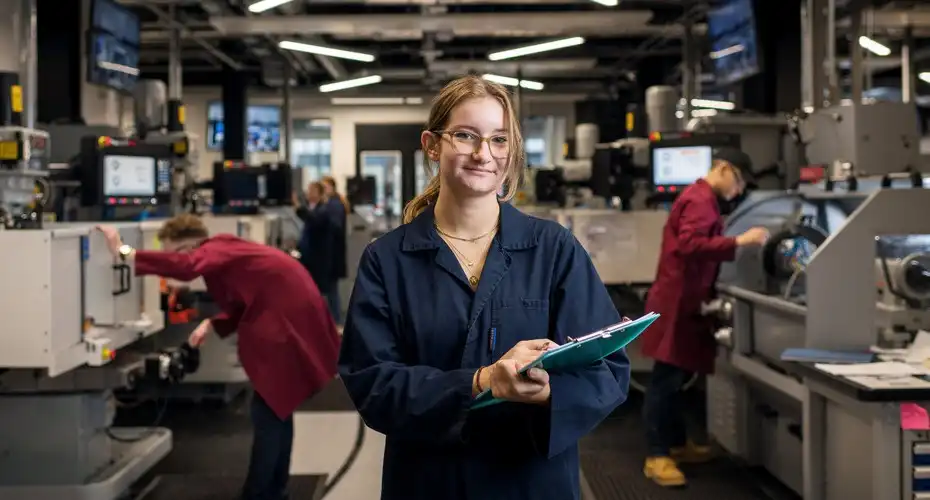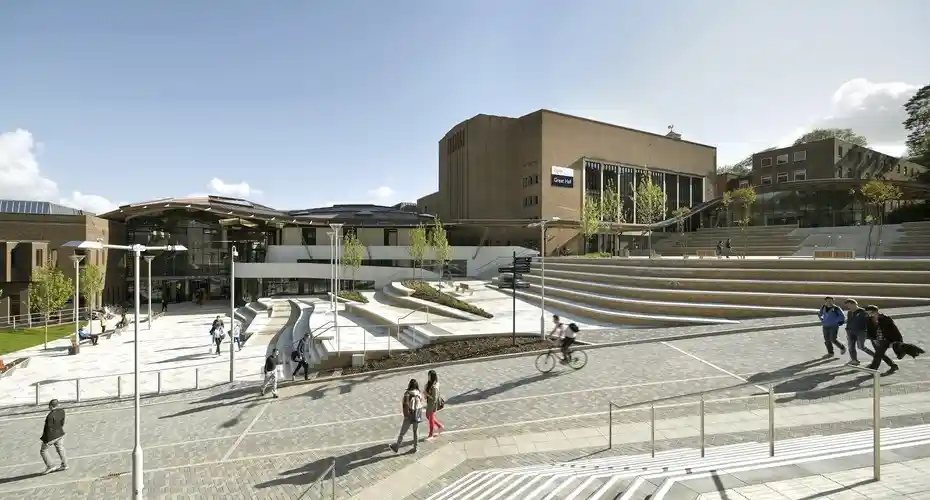| Degrees |
|
|---|---|
| Duration |
| Start date | September, January or April |
|---|---|
| Location | Streatham Campus |
| Study modes |
|
Overview
Drama at Exeter is an internationally-renowned centre for practice, research and teaching, and offers a supportive and stimulating environment for postgraduate research and practice, welcoming students from around the world.
MPhil/PhD Drama - The Department has always insisted on the importance of practice, and interest in research through practice is strongly welcomed. This might include a major interest in theatrical direction, performance, or playwriting associated with written study in the dissertation for drama.
MPhil/PhD Performance Practice - The MPhil/PhD in Performance Practice offers you an opportunity to extend and reflect on your creative performance practice. The area of study is entirely dependent upon your expertise, and could include playwriting, acting, directing, physical theatre, dance theatre, music theatre, or music performance.
The major part of your PhD will be a series of creative projects designed to interrogate the research objectives of your chosen practice. Each creative project will be accompanied by an analytical commentary of normally no more than 10,000 words. Normally, the written commentaries and introductory material for a PhD in Performance Practice extend to 40,000 words.
MA by Research Drama - The Master of Arts by Research in Drama is a research degree that offers you the opportunity to pursue a research project of your choosing. The degree programme is intended both as an award in its own right or as a progression route to a PhD. You will complete an extended dissertation on an area of your particular interest, informed by a critical awareness of the current issues in the discipline, supervised by academic staff. The Masters by Research degree is assessed by a written dissertation of up to 40,000 words.

Whether your research interest concerns performance analysis, ethnographic methods, historical research or theatre practice, we are on hand to support you successfully throughout your PhD.
Contact
Web: Enquire online
Phone: 0300 555 6060 (UK)
+44 (0)1392 723044 (non-UK)
![]()
Top 150 worldwide for Performing Arts
QS World University Subject Rankings 2024
![]()
Supervision from our world-leading experts
![]()
Professional standard performance spaces and state-of-the-art production facilities for video, sound and scenic design
![]()
Top 150 worldwide for Performing Arts
QS World University Subject Rankings 2024
![]()
Supervision from our world-leading experts
Research overview
We work through creative practice, historiography, socially-engaged research, ethnography and transdisciplinary collaboration. We have a particular interest in understanding the marginalizations and exclusions of British theatre cultures and industries; Asian performance cultures and diasporic practices; and the cultural aspects of contemporary concerns such as climate crisis, healthcare and urbanization, space and rurality.
We research a wide range of performance practices, from taking a performance studies lens to everyday cultural activities, to analysing the significance of mainstream and popular theatre forms. We have a well-established reputation for excellence in theatre history, contemporary performance practice and applied/community theatre.
We are a mutually supportive community of staff and postgraduate students, committed to high ethical standards and to challenging reliance on colonial, patriarchal, classed and gender-based hierarchies.
Our research strengths include:
- the relationship between theory and practice (praxis) between actor and character
- the politics of Shakespeare and English drama
- dramaturgy and writing for performance
- actor and performer training
- vocal practice
- gender and performance
- ancient Greek performance
- the theory of performance and interculturalism
- political and popular theatre
- applied theatre in the community
- performance art, new media, and bioart
- theatre and music / music theatre
- site-specific and site-sensitive performance
- auto-performance and autobiography
- theatre and mental health
- Eastern European theatre
- theatre and religion
Many members of staff and research students are involved with one of the Department's three research centres:
- The Centre for Contemporary Performance Practices embraces an exciting range of international research concerned with interdisciplinary and intercultural processes of devising, directing, dramaturgy, performing, training and writing in a diverse array of performance spaces and architectures.
- The Centre for Performance Histories and Cultures embraces a wide range of areas, not only producing historical research but also examining theatre in relation to specific cultural contexts.
- The Centre for Performance, Sciences, and Community fosters scholarly, inter-disciplinary innovation in a diverse range of subjects within and beyond the medical humanities including biology, medicine, neurophysiology, and quantum physics.
Many Drama staff are also involved with the Centre for Intermedia, which promotes advanced transdisciplinary research in performance and the arts through collaborations between artists, academics and scientists from a range of disciplines.
Research in Drama addresses urgent challenges facing contemporary society. The performing arts reflect, represent and reveal processes of cultural change. We also consider everyday social and cultural performance, and use performance as a lens through which to observe the dynamic world in which we live.
Our research covers a range of thematic interests, reflecting ongoing dialogues within the department and beyond it. They are not mutually exclusive and represent broad interests among our current staff. We are interested in connecting with scholars from other disciplines working in these areas, with project partners and stakeholders who share our interests and in postgraduate research that might contribute to our wider understanding.
Creative Industries
International Pedagogies
Class and Labour
Visual Culture and Popular Performance
Environments, Ecologies and Cities
South Asian Performance and Diasporic Practices
Race and Ethnicity
Cultural Participation
Voice, Sound and Music
How to apply
MPhil/PhD Drama
or MPhil/PhD Performance Practice
Students applying to enter directly into the MPhil/PhD programme would normally be expected to have a Masters degree with Merit or equivalent in Drama, Theatre Practice or a related subject, or other relevant qualifications such as a doctorate in another subject.
If you are an international student, please visit our international equivalency pages to enable you to see if your existing academic qualifications meet our entry requirements.
Applying for MPhil/PhD study
You may wish to read our general advice for PhD applicants, which give tips on how to put together a successful research degree application.
Applicants for research programmes are also advised to visit the College's webpages to check for specific advice. Here you will be able to find out about staff research interests and make preliminary enquiries about supervision. We advise that you do this before applying.
Masters by Research Drama
We usually require you to have a good upper second class degree in Drama, Theatre or a related discipline area.
If you are an international student, please visit our international equivalency pages to enable you to see if your existing academic qualifications meet our entry requirements.
English language requirements
International students need to show they have the required level of English language to study this course. The required test scores for this course fall under Profile E: view the required test scores and equivalencies from your country.
Fees and funding
Tuition fees per year 2025/26
- Home: £4,950 full-time; £pro-rata part-time
- International: £23,500 full-time
For those studying for more than one year, our fees are expected to increase modestly in line with Consumer Price Inflation measured in December each year. More information can be found on our Student Finance webpages.
Tuition Fees per year 2024/25
- Home: £4,786 full-time; £pro-rata part-time
- International: £22,600 full-time
For those studying for more than one year, our fees are expected to increase modestly in line with Consumer Price Inflation measured in December each year. More information can be found on our Student Finance webpages.
Our Postgraduate Funding webpage provides links to further information. If you are considering a PhD in the future, in addition to University of Exeter funding, we have been successful at securing postgraduate funding for PhD research through our Funded centres.
Current available funding
Supervision
Supervisors - all students have a primary and a secondary supervisor who provide regular, high quality advice, support and direction in their academic endeavours. You will work closely with your supervisors over three to four years (full time PhD) or six to seven (part-time PhD) to develop, investigate and write-up a project at the cutting edge of theological research.
Visit our Drama staff profiles pages for more information about individual research interests
Mentor - each student will also be assigned a mentor who will take on a pastoral role and mediate on any problems that arise during the period of study. Your mentor will keep in regular contact and will provide background stability and support.
Academic staff research interests are diverse and include:
- international performer training
- contemporary performance practices
- theatre for cultural development and social change
- British Asian performance
- dramaturgy, playwriting and adaptation
- site-specific performance
- theatre historiography
- theatre and wellbeing
- activism and political performance
- nineteenth century popular culture and performance
- physical and dance theatre
- street arts
- diaspora and transnational theatre
- environmental humanities
- live art; theatre and sound
- voice studies
- music as performance
- eighteenth-century performance
- medical humanities
- early modern theatre
- gender and theatre-making
Examples of PhD thesis titles researched by Drama students at the University of Exeter:
- Consciousness and character
- Re: constructing the natural: a trajectory of Bodies, Landscapes and Technologies
- Contemporary Acting in Ancient Hellenistic (Greek) Drama
- Engaging with Theatrical Presence
- British Asian feminist contemporary plays
- Authenticity within practice for the playwright-director
- Theatre as development (Uganda)
- Audience Immersion: Environment, Interactivity, Narrative in the work of Punchdrunk
- The traditions and functions of trance possession found in Thai contemporary rituals as a tool for personal and social efficacy
- Rasa aesthetics and contemporary drama in India and The Diaspora
- The representation of performance aesthetics in "Xingju" (New Theatre) in post-war Taiwan (1945-1970)
Performative walking - The Discussion of Theatrical Issues within The Modern Western Plays and Its Influence on The Egyptian Drama
- Oscar Wilde and visual theatre
- Classroom-based drama
- Feeling the way towards an embodied understanding of performative play and intention in contemporary dance theatre; What is the role of the performer?
- 'Encounters with Jacques Derrida and Emmanuel Levinas in the theatre and beyond: an exploration of ethics, structure and subjectivity through the work of Jerzy Grotowski'
- Applied theatre + domestic violence
- The process of adapting Shakespeare for performance by small casts in contemporary British theatre
- A phenonenocogial/existential analysis of 'being in the moment' according to the teaching of Sanford Meisner
- The theatre of Gunduv Kalic
- Black theatre in Britain
- Taking Apart A Radical's Approach: Charles Marowitz and Shakespearean Adaptation
- Drama: Small scale touring theatre in the South West region
- Afro Brazilian rituals as a source for actor training
- Modernity and tradition in Thai Ukay performance
- From Hypertext to Performance
- Drama and urban regeneration
- Theatre arts and body-consciousness in space in Taiwan
- Narrative and practice: Interdisciplinary qualitative study of embodied practices
- Bright to dark consciousness in pyschophysical actor training
- The performance of heritage
- Contemporary Italian theatre
Careers
We are committed to ensuring you receive high quality research supervision to maximise your potential and prepare you for a rewarding career.
Postgraduate students have access to the wide range of support offered by our Career Zone. In addition, postgraduate research students can access our Postgraduate Researchers' Programme, which covers a range of topics to help you to succeed during your research degree and to act as a springboard for your research career.
Graduate destinations
Below are some examples of initial employment titles and employers of Drama postgraduates who have studied with us in recent years.
Please note that, due to data protection, the job titles and organisations are listed independently and do not necessarily correspond.
Initial Job Titles of Drama Postgraduates:
- Lecturer
- Research Fellow
- Theatre Maker
- Teacher of drama and consultant of drama
- University Fellow in Theatre and Drama
- Arts Practitioner
- Director
- Performer
- Writer and Broadcaster
- Lecturer in performing arts/applied drama
Initial Employers of Drama Postgraduates:
- University of Exeter
- University of Oxford
- University of Wales Trinity Saint David Swansea Metropolitan
- Bangkok University
- Forest Fringe
- Ministry of Education
- National University of Ireland, Galway
- Promendade Promotions Ltd
Facilities
The Drama Department at Exeter offers a supportive and stimulating environment for postgraduate research, welcoming students from all parts of the world. The Department is situated in new, attractive buildings on a modern campus, in quiet surroundings which nevertheless are close to the major facilities of a beautiful and friendly city. Whatever your area of study in the wide field of theatre - performance, theory, writing for performance, criticism, analysis, historiography - you will have access to expert specialist supervision and excellent practical resources, and be able to rely upon support and stimulus from fellow students and members of staff. The Department has a lively tradition of research and creative activity, and by choosing to come to Exeter you will contribute to that impressive reputation.
The cultural region of the South West embraces Bristol and Plymouth as well as Exeter; all three cities have professional theatres, arts centres, and music performance venues. Local facilities include the Exeter Northcott Theatre, Phoenix Arts Centre, The Bike Shed and the University itself. The Old Vic Theatre and the Arnolfini in Bristol are nationally famous centres for the arts. Your studies will benefit from the wide range of exciting performances available in the city and in the surrounding region.
We have invested nearly £4 million in our industry standard drama facilities providing a superb environment for learning and research.
This includes eight large studio spaces (six are fully technically equipped and four have sprung floors), three sound recording studios, state-of-the-art computer facilities for lighting and sound design, two digital media suites for the creation of DVD video and audio to document practice, and workshops for set construction, costume and prop-making.
MPhil and PhD students benefit from a 24-hour postgraduate research student computer suite.
![]()
Professional standard performance spaces and state-of-the-art production facilities for video, sound and scenic design











